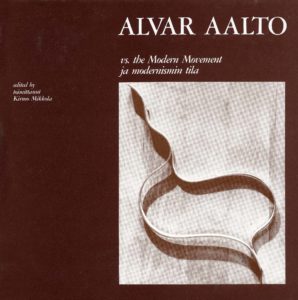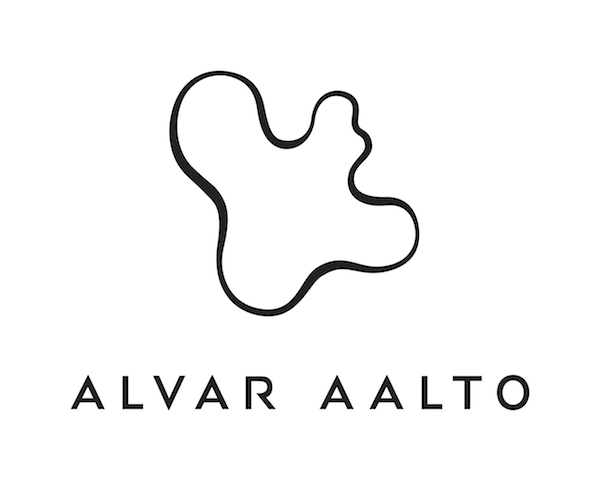
Page
Seminars
The Alvar Aalto Foundation organizes international seminars, training sessions and debates, and holds lectures given by foreign speakers.
Read more
15. 4.
Monday
16. 4.
Tuesday
17. 4.
Wednesday
18. 4.
Thursday
19. 4.
Friday
20. 4.
Saturday
22. 4.
Monday
23. 4.
Tuesday
24. 4.
Wednesday
25. 4.
Thursday
26. 4.
Friday
27. 4.
Saturday
29. 4.
Monday
30. 4.
Tuesday
1. 5.
Wednesday
2. 5.
Thursday
3. 5.
Friday
4. 5.
Saturday
18. 5.
Saturday
20. 5.
Monday
21. 5.
Tuesday
22. 5.
Wednesday
23. 5.
Thursday
24. 5.
Friday
25. 5.
Saturday
The Alvar Aalto Symposiums are international symposiums on architecture held every three years in Jyväskylä with the intention of arousing discussion about the artistic, social and technical problems of modern architecture. The language of the symposiums is English.
Alvar Aalto frequently gave lectures at the Jyväskylä Summer Festival and in 1977, a special Alvar Aalto event was held, which involved a number of lectures and visits to various buildings designed by Alvar Aalto in and around Jyväskylä. The same year, the decision was made to hold the first symposium in 1979. The Alvar Aalto Museum and the Jyväskylä Summer Festival acted as the principal local organizers. Representatives of SAFA (the Finnish Association of Architects), the Museum of Finnish Architecture and the Alvar Aalto Foundation were invited to join the organizing committee.
Nowadays, the principal local organizer of the symposiums is the Alvar Aalto Foundation.
So far, the symposiums have been organized fifteen times and their themes have included the relationship between modern architecture and tradition, popular culture and cultural values, and taking the limitations of natural resources into account in the architecture of today.

Francis Kéré, 11. kansainvälinen Alvar Aalto Symposium, Edge – Paracentric Architecture 7-9.8.2009, Jyväskylä. Kuva: Olli-Pekka Orpo © Alvar Aalto -säätiö.
16. Alvar Aalto Symposium – The Weight of Architecture, 22.-23.8.2024, Jyväskylä
What is the role of architecture and the designer amidst environmental crises, catastrophes and political upheaval? Can design make a difference, solve problems and bring about radical change? What does architecture weigh when the future of the entire planet hangs in the balance? The 16th International Alvar Aalto Symposium – The Weight of Architecture, 22.-23.8.2014 in Jyväskylä will initiate a topical discussion which you are welcome to join.
The 15th International Alvar Aalto Symposium – Future of Industry, focuses on the current challenges of the spaces and milieus of the history, present and future manufacturing industry.
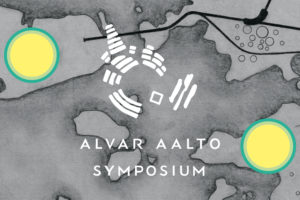
The 14th Alvar Aalto Symposium was held in Jyväskylä, Finland, 30.-31.8.2018. This time the focus was on current challenges and possibilities of future housing design and construction in urban areas. Program consisted of general lectures which were intended to offer a comprehensive understanding of the theme. The chair of the symposium was architect, professor Markku Hedman.
Elina Alatalo (Finland), Selina Anttinen (Finland), Stephen Bates (United Kingdom), Jaakko Blomberg (Finland), Mikkel Frost (Denmark), Anne Kaestle (Switzerland), Antti Lehto (Finland), Katja Maununaho (Finland), Elli Mosayebi (Switzerland), Ola Nylander (Sweden), Sofie Pelsmaker (Belgium), Peter Pichler (Italy), Sini Saarimaa (Finland), Jyrki Tarpio (Finland), Jeremy Till (United Kingdom), Verena Von Beckerath (Germany), ja Anders Tyrrestrup (Norway/Denmark).
The exhibition at the Alvar Aalto Museum – The Housing Problem. Alvar Aalto’s housing architecture – was linked to the theme of the symposium.
The printed version of the publication is available at shop.alvaraalto.fi
The Alvar Aalto Symposium, which has established itself as a recognised architecture event, gathered over 300 architecture enthusiasts to the city of Jyväskylä 7-9 August 2015. The symposium’s theme challenged the speakers and participants to examine architecture from the perspective of doing.
The attraction of the symposium comes from both the interesting themes and the attending people. The lecturers and the architects, designers, students, journalists and other participants from around the world produced a seminar that was rich with discussion and argument.
The Alvar Aalto Foundation produced the event in cooperation with the Museum of Finnish Architecture, Architecture Information Centre Finland and the City of Jyväskylä. The Symposium’s arrangements were supported by the Ministry of Education and Culture and the City of Jyväskylä.
The symposium was chaired by architect Anssi Lassila.
Mikko Heikkinen, Finland Heikkinen-Komonen Architects | Rahul Mehtrotra, India RMA Architects | Bolle Tham ja Martin Videgård, Sweden Tham&Videgård Arkitekter | Raul Pantaleo, Italy TAM Associati | Liu Xiaodu, China Urbanus | Henriette Vamberg, Denmark Gehl Architects | Mikko Summanen , Finland K2S Architects | Carin Smuts, South Africa Carin Smuts Architects | Geir Brendeland ja Olav Kristoffersen, Norway Brendeland & Kristoffersen | Greg Lynn, USA Greg Lynn FORM | Marc Jay ja Julie Schmidt-Nielsen, Denmark WE Architecture | Eero Lundén, Finland Lundén Architecture | Lisa Iwamoto, USA IwamotoScott Architects | Patrick Thurston, Switzerland Architecture Office Patrick Thurston | Kari Virtanen, Finland Nikari | Matti Sanaksenaho, Finland Sanaksenaho Architects
Moderators: David Basulto, ArhcDaily, Chile Juulia Kauste, Museum of Finnish Architecture, Finland Marco Steinberg, Snowcone, Finland Ole Bouman, Shekou Design Museum, China
The Alvar Aalto Symposium, now established as a prestigious architecture event, attracted nearly 400 architecture enthusiasts to Jyväskylä 10–12.8.2012. The Symposium’s theme “Crafted – The Ingredients of Architecture” inspired a wide range of lectures. This 12th Symposium considered the highly diverse ways in which the word crafted occurs in the multifaceted and complex relationship between materials, craft skills, industrial construction and culture. The speakers and the architects, students, journalists and other participants from around the world once again set the scene for an event marked by fruitful conversation and definitive opinions. The successful Symposium was chaired by architect and Professor at Aalto University Pekka Heikkinen.
Marcos Acayaba, Brazil: Design on challenging terrains | Frank Barkow, Germany: Infralight/Ultrastructural | Jürg Conzett, Switzerland: Continuing a Structural Tradition | Richard Kroeker, Canada: The Pursuit of Authenticity | Bjarne Mastenbroek, Netherlands: Fathom | Mohsen Mostafavi, USA: Architecture is a Material Practice | Taira Nishizawa, Japan: Wooden Works | Alan Organschi, USA: Mistaken for Craft | Anu Puustinen & Ville Hara, Finland: Human touch | Alex de Rijke, Great-Britain: Timber is the New Concrete | Takaharu and Yui Tezuka, Japan: Nostalgic Future | Kjetil T. Thorsen, Norway: Snøhetta Works | Sarah Wigglesworth, Great-Britain: Architect as Disc Jockey or Maker: lessons from the portfolio of Sarah Wigglesworth Architects
3 presentations by Design+Build Studios: Aalto University, Finland: Pekka Heikkinen, Pyry-Pekka Kantonen, Janne Kivelä, Markus Heinonen The Architectural Association, Great-Britain: Elizabeth Cunningham Technical University Munich, Germany: Hermann Kaufmann, Stefan Krötsch, Hannah Knoop, Felix Haberstumpf
Discussion moderator: Mark Isitt, Sweden
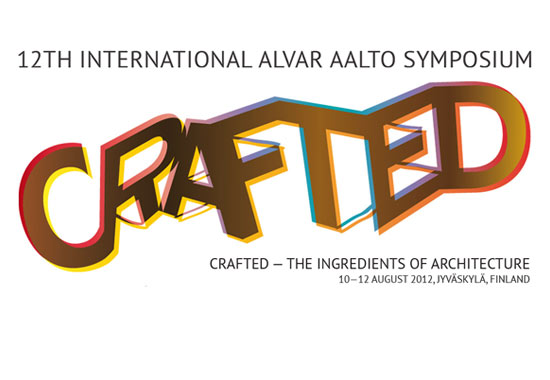
The eleventh international Alvar Aalto Symposium was held in Jyväskylä on 7.8. to 9.8.2009. The chairman of the symposium was Professor Sami Rintala who is himself an architect. The theme of the symposium dealt with architecture on the boundary i.e. architecture outside the centre. This boundary was defined in a different way in the theme of the symposium – it could mean the geographical periphery in relation to the centres of the western world or a difference in ideas in the predominating architectural debate in the media. One border-line area was considered to be the relationship between art and architecture. Within the framework of the theme, ecological factors and issues highlighted by the participation of local inhabitants had a key role.
Over 500 guests from Finland and abroad took part in the symposium.
The first symposium was held in 1979, so that Edge was also jubilee symposium held in honour of the thirtieth anniversary of the event. The anniversary was celebrated with special Symposium 30 products adorned with the jubilee logo designed by Susanna Raunio.
Edge received an award for being the best congress held in Jyväskylä in 2009.
Carin Smuts, How To Listen To People?, South Africa | Yrjö Haila, Embedded in the Biospher, Finland | Anna Heringer, Building for Change – Handmade Architecture in Bangladesh, Austria | Saija Hollmén / Jenni Reuter / Helena Sandman, Beyond Design, Finland | Geir Tore Holm, Indoor House, Norway | Olavi Koponen, Strokes, Finland | Juhani Pallasmaa, The Limits Of Architecture – between reality and fiction, Finland | Patama Roonrakwit, Out of professional practice, Thailand | Mauricio Pezo / Sofia von Ellrichshausen, Short Memory, Chile | Bijoy Jain, Dialogue and Deviation. India: Building in times of change, India | Alexander Brodsky, Untitled lecture, Russia Francis Kéré, Step by step: Sustainable buildings for Africa, Burkina Faso | Dan Rockhill, Design and Construction: Hand and Mind The work of Rockhill and Associates and Studio 804, USA | Esa Laaksonen, Finland
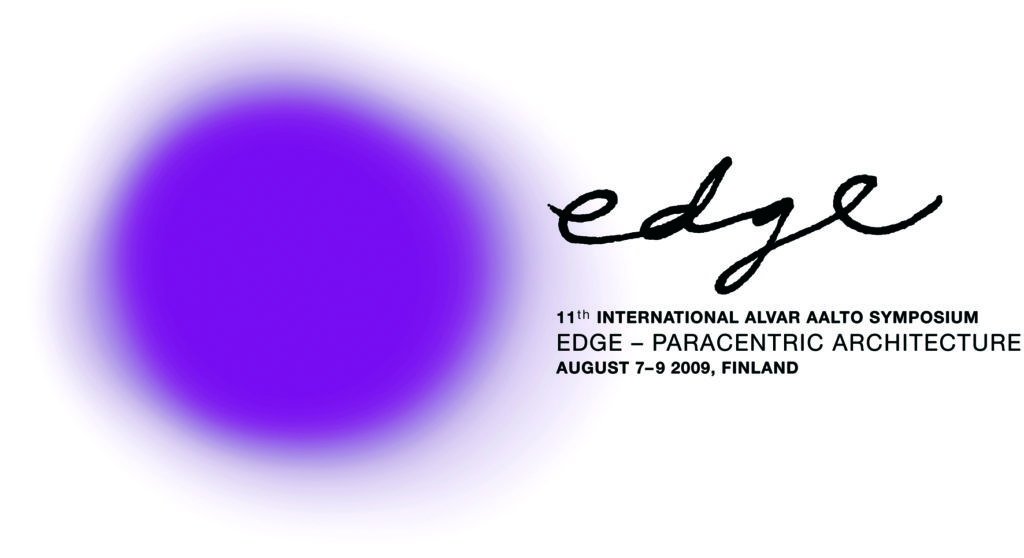

11. kansainvälinen Alvar Aalto Symposium, Edge – Paracentric Architecture. 7.-9.8.2009. Kuva: Olli-Pekka Orpo © Alvar Aalto -säätiö.
The tenth international Alvar Aalto Symposium was held in Jyväskylä on 28.7 to 30.7.2006. The theme of the symposium was the opinion developed by Alvar Aalto about the future of rationalist architecture, which included the proviso that the concept of rationality should be extended widely. The theme was taken up by a group of international speakers consisting of eight architects, a landscape architect and a composer. The chairman of the symposium was the architect Juha Ilonen.
In connection with the symposium, an architectural exhibition entitled Speakers at Work was held at the Alvar Aalto Museum in Jyväskylä showing the work of the principal speakers at the symposium.
A publication was compiled about the symposium.
Florian Beigel Teasing Modernity, UK
Gavin Bryars Spaces Heard, Sounds Seen, UKn
Sean Godsell Regional Realities, Australia
Dorte Mandrup-Poulsen Visions of a Good Life, Denmark
Manuel Aires Mateus Solids and Voids, Portugal
Samuli Miettinen Contemporary and Timeless, Finland
Fuensanta Nieto, Enrique Sobejano Discovering Architectural Grounds, Spain
Martin Rein-Cano Extending the Concept of Landscape, Germany
Brigitte Shim, Canada
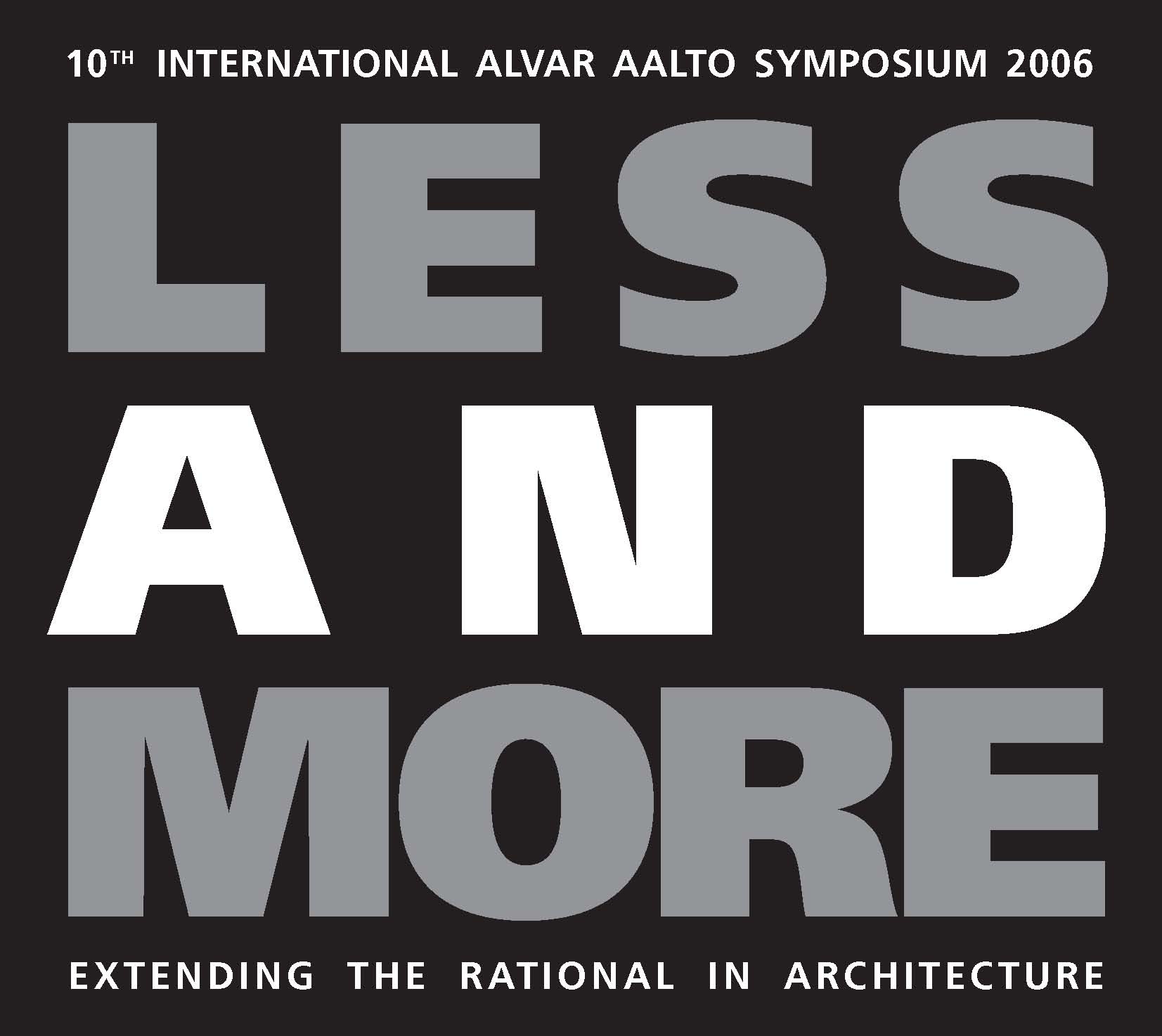
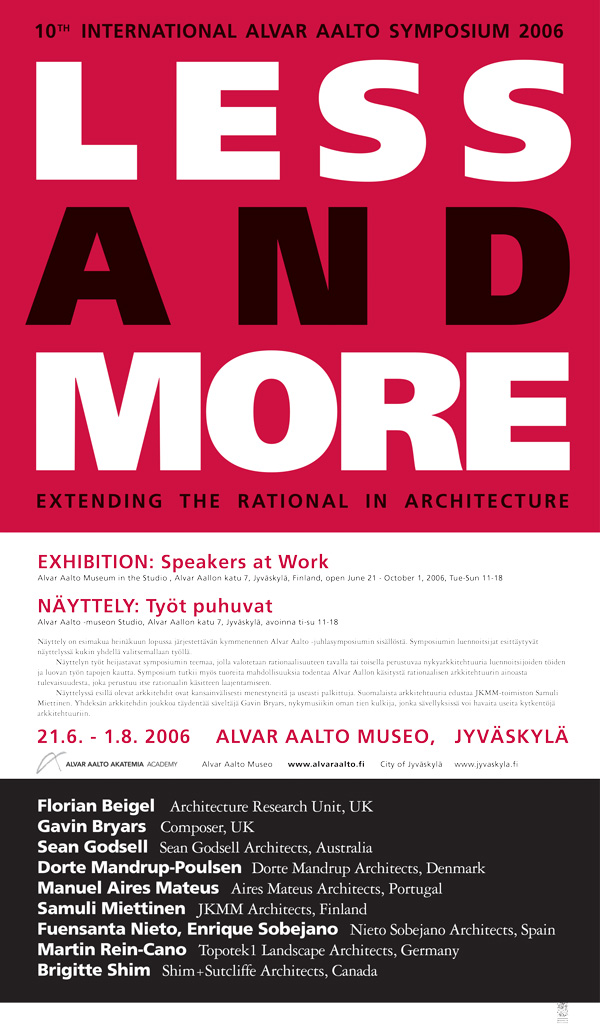
The ninth international Alvar Aalto Symposium was held in Jyväskylä on 1.8 to 3.8.2003.
In connection with the theme of the event, nine speakers considered the relationship between permanence and chance in architecture. The symposium ended in the traditional manner with a discussion. The chairman of the symposium was the architect Mikko Heikkinen.
Peter von Bagh, Finland
Carl-Viggo Hølmebakk, Norway
Rick Joy, USA
Anne Lacaton, France
Luis Moreno Mansilla, Spain
Hiroshi Naito, Japan
Pekka Pitkänen, Finland
Rogelio Salmona, Columbia
James Turrell, USA
Brit Andresen, Australia
Willim J. R. Curtis, France / UK
Nicholas Murcutt, Australia
Markku Pätilä, Finland
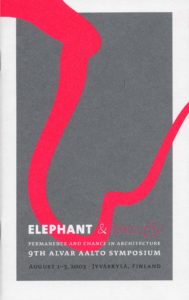
The eighth international Alvar Aalto Symposium was held in Jyväskylä on 11.8 to 13.8.2000. The millennium year, 2000, led to the theme being distilled into the question of whether architecture could start from a clean slate in the year zero. This caused the lecturers to think about the meaning of the history of architecture, values, individuality, and genius loci in terms of contemporary architecture. The chairman of the symposium was the architect Pentti Kareoja.
An exhibition of the work of the Soundings for Architecture 2 Workshop was opened in connection with the symposium at Jyväskylä public library.
A publication entitled Architecture in the Year Zero was compiled about the symposium.
Luis Fernandez-Galiano, Spain Catastrophic Forms in the Contemporary Universe
Kristian Gullichsen, Finland Architecture is an Elephant
Jan Olav Jensen, Norway Precision and Tolerances
Billie Tsien, USA Two ways of saying listen
Winy Maas, The Netherlands
Ákos Moravánszky, Hungary / Switzerland Flows and Frictions – The Resistance of the Material
Shigeru Ban, Japan The Genealogy of an Architect
Enrique Norten, Mexico Architecture of Time
Annette Gigon, Switzerland Concepts into Matter, Matter into Architecture
Carlos Ferrater, Spain Landscape, Systems, Light, Materiality
Peter MacKeith, USA
Raoul Bunschoten, The Netherlands / UK
Glenn Murcutt, Australia
Juhani Pallasmaa, Finland
Tod Williams, USA

The seventh international Alvar Aalto Symposium was held in Jyväskylä on 15.8 to 17.8.1997. The chairman of the symposium was the architect Simo Paavilainen. The invited speakers represented various disciplines from architecture to philosophy and from music to literature. It may well be that successful combinations of matter and mind, and material and meaning, would allow a balanced architecture in which form and detail are not unconnected so that form would have meaning.
Karsten Harries, USA Is Stone Today ‘More Stone than it Used to Be’? Matter, Meaning and Mind in Architecture
Vittorio Gregotti, Italy The Visible City
Kazuyo Sejima, Japan Buildings
Wilfried Wang, Germany Architecture as Material Abstraction
Göran Schildt, Finland Alvar Aalto and Human Error
Juan Navarro Baldeweg, Spain Complementary Geometry
Gert Wingårdh, Sweden Buildings and Projects
John Patkau, Canada Material Differences
Alejandro Zaera-Polo, UK Mind after Matter
Kaija Saariaho, Finland Matter and Mind in Music
Juha Leiviskä, Finland About Architecture
The sixth international Alvar Aalto Symposium was held in Jyväskylä on 19.8 to 21.8.1994. The aim of the symposium was to assess the basic questions of architecture, i.e. what are the fundamental issues in the built environment and in its design. The scarcity of the economic resources used for building and the necessity to take ecological factors into account mean that particular attention has to be paid to architectural design for the results to be sustainable solutions which take cultural values into account.
The symposium ended with a tour of buildings designed by Alvar Aalto in and around Jyväskylä.
During the symposium, there was an exhibition at the Alvar Aalto Museum of glass-ware designed by Alvar Aalto from the collection of the architect Touko Saari.
A publication entitled Architecture of the Essential (available on our webshop) was compiled on the symposium.
Paul Oliver, UK Architecture of the essential: Sources, recources and recourcefullness
Glenn Murcutt, Australia Ecological Architecture
Elias Torres, Spain Skylight
Zissis Kotionis, Greece The Essential in the Pathology of Architecture; Five Greek Architects
Pekka Korvenmaa The Cricis as Catalyst
Peter Zumthor, Switzerland Passion
Toyo Ito, Japan Architecture that creates the environment
Alberto Campo Baeza, Spain More with Less
Juhani Pallasmaa, Finland The ecological functionalism of animal constructions
Mary Miss, USA
The publication is available at shop.alvaraalto.fi.
The fifth international Alvar Aalto Symposium was held in Jyväskylä on 16.8 to 18.8.1991. The theme of the symposium returned to the roots of modern architecture and considered whether solutions to the problems of contemporary architecture could still be found on the basis of the Functionalist tradition. Twelve international experts spoke on the theme and the chairman of the symposium was the architect Kristian Gullichsen.
During the symposium, the Alvar Aalto Museum opened a renewed permanent exhibition dealing with the work of Alvar Aalto and an exhibition showing the work of Alvar Aalto’s artist friends and kindred spirits. At the Museum of Central Finland, there was an exhibition about the architect Sven Markelius put together by the Swedish Museum of Architecture.
After the symposium, an excursion was organized to visit examples of Finnish Functionalist architecture.
Ricardo Legorreta, Mexico Contemplations
Balkrishna V. Doshi, India Brahmand – Between the Built and the Un-built
Karljosef Schattner, Germany Tightrope Walk Between History and Modernism
Wladimir Slapeta, Czechoslovakia On Czechoslovak Functionalism
William J.R. Curtis, UK The Idea of a Modern Tradition
Ignasi de Sola-Morales, Spain High-Tech : Functionalism or Rhetoric ?
Björn Linn, Sweden The Modernity of Functionalism
Steven Holl, USA Edge of a City
Colin St. John Wilson, UK Functionalism and the Uncompleted Programme
Juhani Pallasmaa, Finland From Metaphorical to Ecological Functionalism
Göran Schildt, Finland Was Alvar Aalto a Functionalist?
Riitta Nikula, Finland Functionalism and Scarcity: The Legacy of Erik Bryggman’s Architecture
Gudmundur Jonsson, Iceland The Issue and the Origin
Andres Siim, Estonia Four Projects
Mikko Heikkinen – Markku Komonen, Finland Within Structures
Pentti Kareoja, Finland Observations about Architecture
Marjaana Kinnermä, Finland What Is
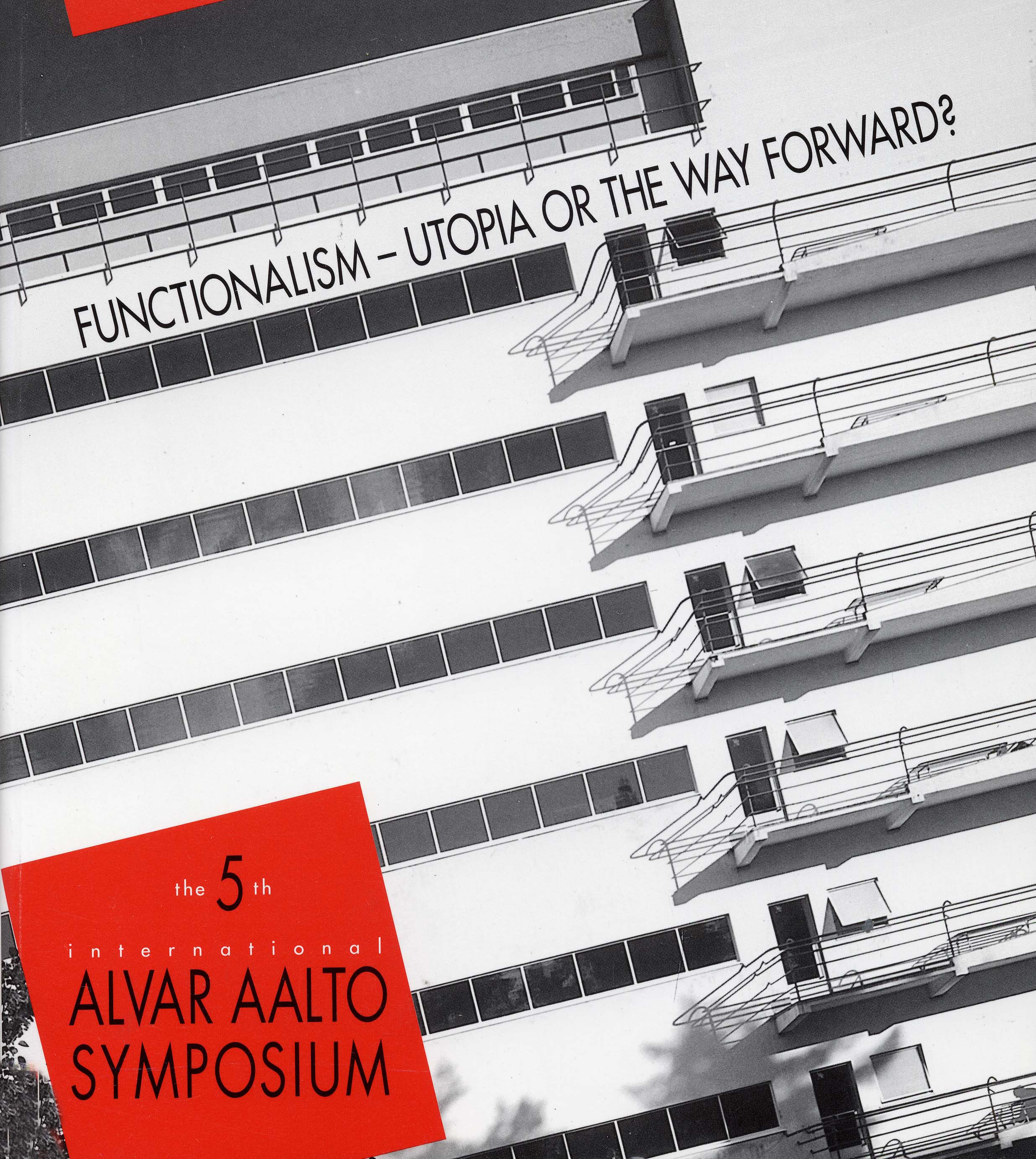
The fourth international Alvar Aalto Symposium was held in Jyväskylä on 19.8 to 21.8.1988.
The lecturers at the symposium considered the impact of worldwide uniform popular culture on architecture – does this kind of uniform culture control the architecture that arises from local characteristics or can an architecture that respects culture in a new way arise from local starting points? The symposium was chaired by the architect Gunnel Adlercreutz.
In connection with the symposium, the Alvar Aalto Museum presented an exhibition consisting of a cross-section of Alvar Aalto’s architecture. In addition to this, there was an exhibition in the foyer of the Jyväskylä City Theatre by architects, who had previously worked in Alvar Aalto’s office, of their own work. Once again, the symposium attracted a large international audience of about 400 visitors from 32 countries.
A publication was compiled on the symposium.
Kenneth Frampton, USA In search of a laconic line; a note on the school of Porto
Arata Isozaki, Japan Works
Carl Nyren, Sweden The importance of the Swedish poverty
Alvaro Siza, Portugal Views
Francesco Venezia, Italy Works
Jorge Glusberg, Argentina Recent architecture in South America
Malcolm Quantrill, UK It is time to reinvent reality and reconstruct architecture
Göran Schildt, Finland Alvar Aalto and cultural values
Georg Henrik von Wright, Finland The myth of progress
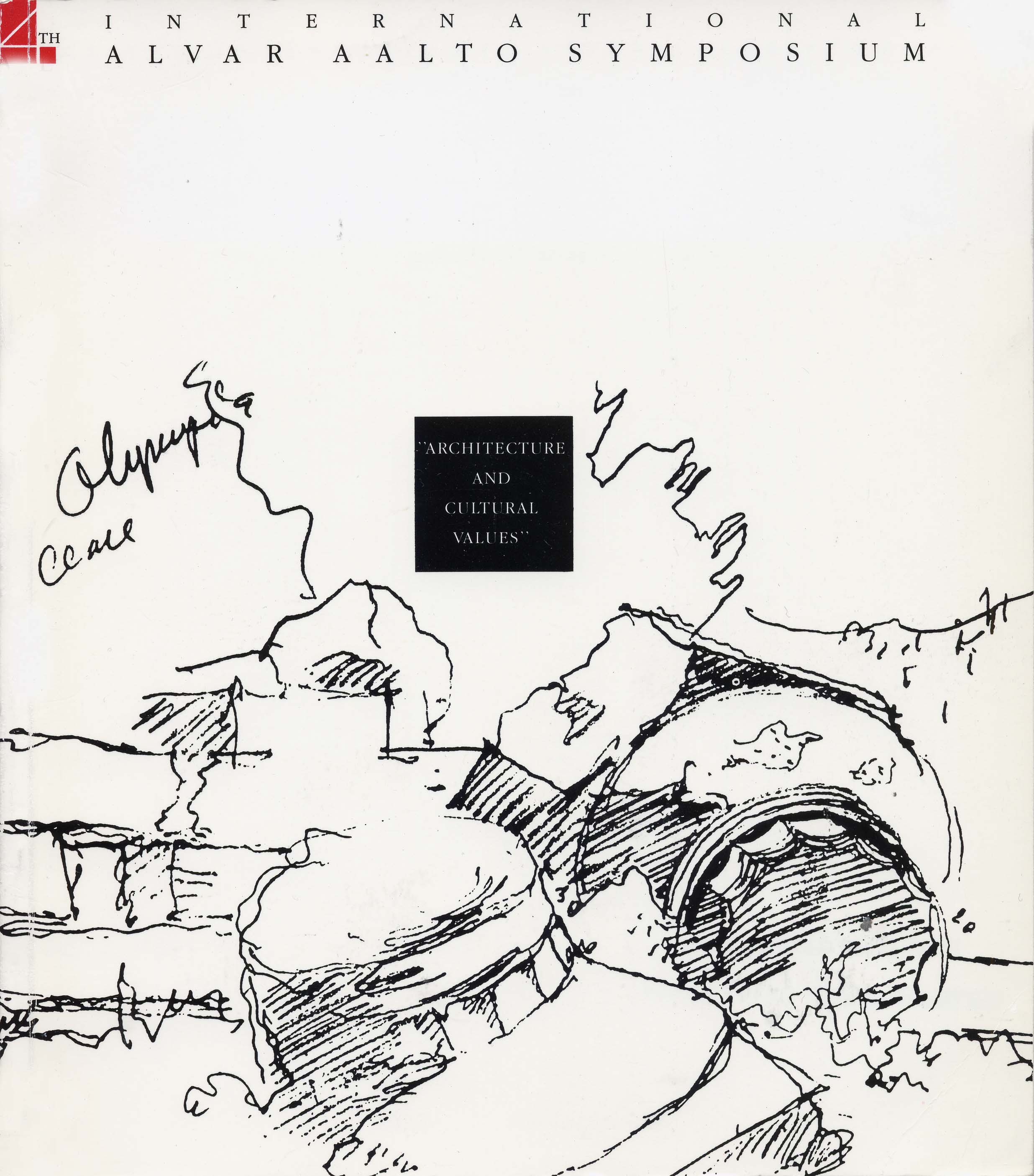
The third international Alvar Aalto Symposium was held in Jyväskylä on 12.8 to 14.8.1985. The theme of the symposium dealt with the differences between popular culture and high culture since there seemed to be a somewhat similar division in architecture as there was, for example, in music. Eleven lecturers from around the world considered this division from the point of view of architecture. The chairman of the symposium was the architect Juhani Pallasmaa.
During the symposium, the Museum of Central Finland organized an exhibition on the architecture of Reima Pietilä. The symposium was preceded by a two-day seminar at the Villa Mairea, organized by the Museum of Finnish Architecture. Around 370 guests from 24 countries took part in the symposium.
The lectures given at the symposium were collected into a publication.
Michael Graves, USA A case for figurative architecture
Charles Correa, India Transfers and transformations
Henning Larsen, Denmark Notes on the ministry of foreign affairs building, Riyadh, Saudi Arabia
Roland Schweitzer, France The architect between true tradition and false attitudes, comments on some themes discussed at the symposium
Herman Hertzberger, The Netherlands The space mechanism of the twentieth century or formal order and daily life; front sides and back sides
Marc Treib, USA Cultural exchange: low style, high style
Göran Schildt, Finland Alvar Aalto and conventionality
Jörn Donner, Finland Divergencies and convergencies between literature and architecture
Peter von Bagh, Finland Testimony of a film freak
Mikko Heiniö, Finland Art music and popular music
Reima Pietilä, Finland Intermediate zones in modern architecture

The second international Alvar Aalto Symposium was held in Jyväskylä on 6.8 to 8.8.1982. The nine lectures given at the symposium dealt with the relationship of modern architecture to the Classical heritage. The idea was to use the lectures to stimulate debate about themes deemed to be topical. Again, the event collected a large group of participants from many countries. The chairman of the symposium was the architect Matti K. Mäkinen.
Elias Cornell, Sweden The modernists and history
Kenneth Frampton, USA Notes on classical and modern themes in the architecture of Mies van der Rohe and August Perret
Björn Linn, Sweden The transition from classicism to functionalism in Scandinavia
David Watkin, UK Modernism and morality
Demetri Porphyrios, UK Modern classicism
Philippe Boudon, France Alvar Aalto – a non-classical perspective
Stuart Wrede, Finland / USA Asplund’s Villa Snellman; the classical, the vernacular and modernism
Göran Schildt, Finland Alvar Aalto and the classical tradition
Kirmo Mikkola, Finland The transition from classicism to functionalism in Scandinavia
The first international Alvar Aalto Symposium was held in Jyväskylä on 1.7 to 3.7.1979.
Architect Kirmo Mikkola was invited to be chairman. The theme of the symposium was closely linked with Alvar Aalto’s architecture, focussing on the legacy of modern architecture and its relationship with the work of Alvar Aalto.
The first symposium attracted a good deal of attention in both the Finnish and foreign media and was attended by over 400 visitors with an interest in the theme, from fourteen different countries.
While the symposium was in progress, an exhibition by Leonardo Mosso on Alvar Aalto’s architecture was held at the Alvar Aalto Museum.
Publication is available on our webshop.
Colin St. John Wilson, UK Alvar Aalto and the state of Modernism
Claude Schnaidt, France The inheritance of the 1920s
Andrei Gozak, Soviet Union Aalto and the ethics of creative work
Nils Erik Wickberg, Finland Finnish architecture in the early 1900s and Alvar Aalto
Göran Schildt, Finland Aalto, Bauhaus and the creative experiment
Pekka Helin, Finland The state of modernism
Jan Söderlund, Finland The tradition of functionalism
